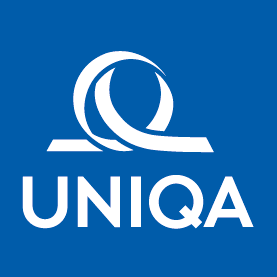Group business development
- Premiums written (including savings portions from unit-and index-linked life insurance) fell to €5,048.2 million on account of a decrease in single premiums in Austria
- Combined ratio increased slightly from 97.9 per cent to 98.1 per cent
- Earnings before taxes of €225.5 million in 2016
- Consolidated profit/(loss) of €148.1 million
- Dividends of €0.49 per share proposed for 2016
- A slight increase in premium revenue and pre-tax earnings expected in 2017
In € million |
2016 |
2015 |
Premiums written including savings portions from unit-linked and index-linked life insurance |
5,048.2 |
5,211.0 |
Cost ratio (after reinsurance) |
26.6% |
23.7% |
Combined ratio (after reinsurance) |
98.1% |
97.9% |
Earnings before taxes |
225.5 |
397.8 |
Consolidated profit/(loss) (proportion of the net profit for the year |
148.1 |
337.2 |
UNIQA provides life and health insurance and is active in almost all lines of property and casualty insurance. It serves about 9.6 million customers with over 18.8 million insurance contracts with a premium volume written (including savings portions from the unit-linked and index-linked life insurance) of about €5.0 billion (2015: €5.2 billion) and investments of €25.5 billion (2015: €29.4 billion). UNIQA is the second-largest insurer in Austria. UNIQA has a strong network in Central and Eastern Europe with a presence in 15 countries and is additionally active in Liechtenstein and Switzerland.
Premium development
UNIQA’s total premium volume decreased in 2016, taking into account the savings portions of the unit-linked and index-linked life insurance in the amount of €405.1 million (2015: €382.0 million), by 3.1 per cent to €5,048.2 million (2015: €5,211.0 million).
In the area of insurance policies with recurring premium payments, there was a rise of 2.3 per cent to €4,879.0 million (2015: €4,770.4 million). In the single premium business, the premium volume decreased by 61.6 per cent to €169.2 million (2015: €440.6 million) due to restraint in the Austrian single premium business.
Premiums written in property and casualty insurance grew in 2016 by 3.2 per cent to €2,518.4 million (2015: €2,439.2 million). In health insurance, premiums written in the reporting period increased by 4.1 per cent to €1,003.7 million (2015: €964.4 million). In life insurance, the premiums written including savings portions from the unit-linked and index-linked life insurance fell overall by 15.6 per cent to €1,526.1 million (2015: €1,807.5 million). The general lack of single premiums in the UNIQA Austria segment was the reason for this.
The Group premiums earned, including savings portions from the unit-linked and index-linked life insurance (after reinsurance) in the amount of €384.7 million (2015: €365.9 million), fell by 3.8 per cent to €4,827.7 million (2015: €5,017.0 million). The volume of premiums earned (net, in accordance with IFRSs) fell by 4.5 per cent to €4,443.0 million (2015: €4,651.1 million).
In € million |
2016 |
2015 |
Premiums written |
2,518.4 |
2,439.2 |
Insurance benefits (net) |
–1,550.6 |
–1,553.7 |
Claims rate (after reinsurance) |
65.7% |
67.5% |
Operating expenses (net) |
–763.2 |
–699.6 |
Cost ratio (after reinsurance) |
32.4% |
30.4% |
Combined ratio (after reinsurance) |
98.1% |
97.9% |
Net investment income |
132.6 |
117.2 |
Earnings before taxes |
57.9 |
71.4 |
Technical provisions (net) |
2,708.4 |
2,869.6 |
Development of insurance benefits
The insurance benefits before reinsurance (see note 32 in the consolidated financial statements) decreased in the 2016 financial year by 8.1 per cent to €3,478.2 million (2015: €3,786.4 million). Consolidated net insurance benefits also fell in the past year by 7.8 per cent to €3,385.6 million (2015: €3,671.3 million). In 2016, the loss ratio after reinsurance in property and casualty insurance fell to 65.7 per cent (2015: 67.5 per cent), primarily on account of lower damages caused by natural disasters and despite an extraordinary claim load in Poland. The combined ratio after reinsurance increased slightly, however, at the Group level – despite an improved loss ratio – to 98.1 per cent (2015: 97.9 per cent) due to increased costs incurred by the innovation and investment programme.
Operating expenses
Total consolidated operating expenses (see note 33 in the consolidated financial statements) less reinsurance commission and share of profit from reinsurance ceded increased in the 2016 financial year by 8.1 per cent to €1,286.4 million (2015: €1,190.4 million). Expenses for the acquisition of insurance less reinsurance commission and share of profit from reinsurance ceded in the amount of €21.3 million (2015: €19.1 million) rose – due to a limited increase in provisions in the health insurance and life insurance businesses – by 3.0 per cent to €869.4 million (2015: €844.2 million). Other operating expenses (administrative expenses) increased as a result of expenses amounting to approximately €55 million in connection with the innovation and investment programme by 20.4 per cent to €417.0 million (2015: €346.3 million). Furthermore, adjustments in the works agreements for the pension fund scheme in the previous year had a positive effect on operating expenses.
UNIQA’s cost ratio after reinsurance, i.e. the ratio of total operating expenses less the amounts received from reinsurance commission and share of profit from reinsurance ceded to the Group premiums earned including savings portions from the unit-linked and index-linked life insurance, increased to 26.6 per cent during the past year (2015: 23.7 per cent) as a result of the developments mentioned above. The cost ratio before reinsurance was 26.1 per cent (2015: 23.3 per cent).
Investment income
The overall investment portfolio (including investment property, financial assets accounted for using the equity method, unit-linked and index-linked life insurance investments, and cash and cash equivalents) fell in the 2016 financial year due to the sale of Italian subsidiaries by €3,961.4 million to €25,454.6 million (31 December 2015: €29,416.1 million).
Net investment income fell by 19.5 per cent to €588.9 million (2015: €732.0 million) as a result of the low interest rates and significantly reduced gains from the disposal of property. In addition, the restructuring of strategic asset allocation for economic optimisation of capital and positive currency effects from investments in US dollars had a positive effect. In the 2016 financial year, one of the positive factors was the sale of the stake in Niederösterreichische Versicherung AG, which resulted in investment income amounting to €37.2 million. Due to the recognition of the 14.3 per cent holding in STRABAG SE using the equity method, there was a positive contribution in the amount of €30.9 million in 2016 (2015: €23.7 million). A detailed description of the investment income can be found in the consolidated financial statements (see note 34).
Other income and other expenses
Other income rose in 2016 mainly due to differences in the exchange rate of the Russian rouble by 18.8 per cent to €42.6 million (2015: €35.8 million). Other operating expenses for the year fell by 4.6 per cent to €53.1 million (2015: €55.7 million).
Results
The technical result of the UNIQA Group fell significantly in 2016 by 60.3 per cent to €73.9 million (2015: €185.9 million). Operating profit fell by 31.6 per cent to €318.8 million (2015: €466.2 million). Earnings before taxes at UNIQA fell by 43.3 per cent to €225.5 million (2015: €397.8 million), mainly because of a decrease in investment income and increased finance costs. Profit/(loss) for the year fell by 56.1 per cent to €149.6 million (2015: €340.7 million). This includes losses from discontinued operations (after tax) amounting to €–53.1 million (2015: €23.1 million) due to the sale of Group companies in Italy. Income tax expense fell in 2016 by €57.5 million to €22.8 million (2015: €80.3 million) due to higher tax-free investment income, tax revenues from previous years, as well as a reduction in tax rates. The consolidated profit/(loss), i.e. the proportion of the net profit for the year attributable to the shareholders of UNIQA Insurance Group AG, amounted to €148.1 million (2015: €337.2 million). Earnings per share fell accordingly to €0.48 (2015: €1.09). Operating return on equity (earnings before taxes and amortisation of goodwill and impairment losses in relation to average equity including non-controlling interests and excluding the accumulated profits of the measurement of financial instruments available for sale) came to 10.0 per cent in 2016 after the exclusion of the Italian Group companies (2015: 17.2 per cent). The return on equity (after tax and non-controlling interests) was 4.7 per cent (2015: 10.9 per cent).
On this basis therefore the Management Board will propose a dividend of 49 cents per share to the Supervisory Board and the Annual General Meeting (2015: 47 cents per share).
In € million |
2016 |
2015 |
Premiums written |
1,003.7 |
964.4 |
Insurance benefits (net) |
–843.6 |
–781.7 |
Operating expenses (net) |
–175.5 |
–153.7 |
Cost ratio (after reinsurance) |
17.5% |
15.9% |
Net investment income |
114.9 |
140.1 |
Earnings before taxes |
96.1 |
171.3 |
Technical provisions (net) |
2,880.1 |
2,779.0 |
Own funds and total assets
Total equity attributable to the shareholders of UNIQA Insurance Group AG increased slightly in the past financial year by €41.7 million to €3,186.3 million (31 December 2015: €3,144.5 million). The non-controlling interests came to €26.5 million (31 December 2015: €21.9 million). The total assets of the Group remained almost unchanged in the reporting period and amounted to €33,639.2 million as at 31 December 2016 (31 December 2015: €33,297.9 million).
Cash flow
UNIQA’s net cash flow from operating activities amounted to €976.9 million in 2016 (2015: €146.8 million). Of this, €586.5 million came from discontinued operations. Net cash flow from investing activities amounted to €–919.5 million (2015: €–586.4 million), of which €–593.3 million resulted from discontinued operations. Net cash flow from financing activities fell to €–398.5 million (2015: €–354.3 million). due to the repayment of subordinated capital bonds (Tier 2). Overall, cash and cash equivalents fell by €340.1 million to €549.9 million (2015: €890.1 million).
In € million |
2016 |
2015 |
Premiums written including savings portions from unit-linked |
1,526.1 |
1,807.5 |
Insurance benefits (net) |
–991.4 |
–1,335.9 |
Operating expenses (net) |
–347.7 |
–337.1 |
Cost ratio (after reinsurance) |
23.7% |
19.2% |
Net investment income |
341.4 |
474.7 |
Earnings before taxes |
71.6 |
155.2 |
Technical provisions (net) |
16,224.3 |
19,990.3 |
Employees
In 2016 the average number of employees (full-time equivalents, or FTEs) at UNIQA fell to 12,855 (2015: 13,782). These included 4,630 (2015: 5,397) field sales employees. The number of employees in administration amounted to 8,225 (2015: 8,385).
In the 2016 financial year the Group had 2,533 FTEs (2015: 2,591) in the Central Europe region (CE) – Poland, Slovakia, the Czech Republic and Hungary) – while 2,359 FTEs (2015: 2,561) worked in the Southeastern Europe region (SEE) – Albania, Bosnia and Herzegovina, Bulgaria, Kosovo, Croatia, Macedonia, Montenegro and Serbia – and 1,834 FTEs (2015: 2,068) in the Eastern Europe region (EE) of Romania and Ukraine. There are 102 FTEs (2015: 96) working in Russia (RU). The average number of FTEs in the Western European markets in 2016 was 41 (2015: 38). A total of 5,986 FTEs were employed in Austria (2015: 6,428). Including the employees of the general agencies working exclusively for UNIQA, the total number of people (FTEs) working for the Group amounts to 19,578.
In 2016, 57 per cent of the staff working in administrative positions at UNIQA in Austria were women. Among sales employees, the ratio was 55 per cent men to 45 per cent women. The average age in the past year was 42 years (in Austria 44; internationally 40 years).
In Austria in 2016, a total of 15.0 per cent (2015: 14.8 per cent) of the employees participated in UNIQA’s bonus system – a variable remuneration system that is tied both to the success of the Company and to personal performance. In addition, UNIQA offers young people in training the opportunity to get to know foreign cultures and make international contacts. Currently, 28 apprentices are being trained. Thirteen new apprentices were accepted in 2016.

